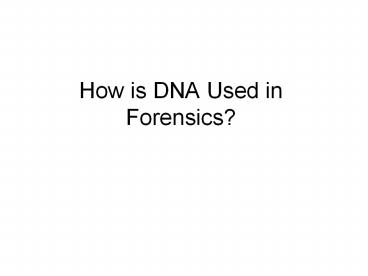How is DNA Used in Forensics? - PowerPoint PPT Presentation
1 / 18
Title:
How is DNA Used in Forensics?
Description:
Investigators gather samples from the crime scene and from suspects and then ... Smear s, scalpels, tweezers, scissors, sterile cloth squares, UV light, ... – PowerPoint PPT presentation
Number of Views:163
Avg rating:3.0/5.0
Title: How is DNA Used in Forensics?
1
How is DNA Used in Forensics?
2
DNA Collection Comparison
- Overview
- Investigators gather samples from the crime scene
and from suspects and then analyze it for a set
of specific DNA regions or markers. - A match of one marker is not usually unique, but
if a sample matches four or five markers, there
is a very good chance it is a match.
3
DNA Collection Comparison
- DNA is collected at crime scenes in a variety of
ways using tools such as - Smear slides, scalpels, tweezers, scissors,
sterile cloth squares, UV light, luminol and/or
blood collection kits (for sample collection of
suspects or living victims) - DNA samples can be from
- Saliva, blood, hair strands, skin, finger or toe
nails, and/or a tooth with root material
4
DNA Collection Comparison
- How is blood collected?
- Blood on Clothing?
- Investigators submit whole pieces of clothing or
they may use a sterile cloth square and a small
amount of distilled water - Dried blood on furniture?
- Investigators send the whole object to the lab
- Dried blood on a wall, tub or some other object
too big or difficult to move to the lab? - Investigators scrape the blood sample into a
sterile container for further analysis
5
DNA Collection Comparison
- Analysis of DNA??
- Uses various DNA Technologies
- RFLP
- PCR
- STR
- Mitochondrial DNA Analysis
6
RFLP Restriction Fragment Length Polymorphism
- Analyzes variable lengths of DNA fragments
- One of the original applications of DNA analysis
- Not used as much anymore because it requires a
large quantity of DNA sample and samples degraded
by the environment do not work well with RFLP
7
PCR Polymerase Chain Reaction
- Used to make millions of exact copies of DNA from
a biological sample - Allows very small samples to be analyzed, such as
a sample of a few skin cells - Must be very careful about contamination in this
process
8
STR Short Tandem Repeat
- Evaluates specific regions (loci) within nuclear
DNA - FBI uses 13 standard specific STR regions for
CODIS
9
Mitochondrial DNA Analysis
- Used for samples that cannot be analyzed using
RFLP or STR - Uses DNA extracted from mitochondrion rather than
nuclear DNA - Especially useful in old cases and old samples
10
DNA Collection Comparison
- What happens after the samples are collected?
- A DNA profile is created.how??
- Markers are found by designing small pieces of
DNA (probes) that will seek out and bind to
complementary DNA sequences. This creates a
distinct pattern. Again, one marker is not
usually unique, but with four or five regions the
match is likely - The DNA profiles are compared with samples from
suspects to find possible matches. - If there are no suspects, a national database
called CODIS may be used to find potential
suspects.
11
DNA Collection Comparison
- More on CODIS
- Stands for Combined DNA Index System
- National Network that helps identify leads for
crimes with no suspects - Three tiers Local (LDIS), State (SDIS), National
(NDIS) - Uses 13 DNA regions that vary from person to
person - Looks for matches at more than one location on a
genome for more accurate results
12
Sources of DNA at Crime Scenes
- Cool table at
- http//www.dna.gov/basics/evidence_collection/iden
tifying
13
Sources of DNA at Crime Scenes
- Examples of sources from real cases
- Saliva on the stamp of a stalkers threatening
letter - Skin cells shed on a ligature of a strangled
victim - Perspiration on a baseball cap discarded by a
rapist was compared with the DNA in the saliva
swabbed from a bite mark on a different rape
victim - DNA analysis of a single hair (without the root)
found deep in a victims throat - Maggots can contain DNA
- of a perpetrator
14
How can DNA evidence be planted??
- Sneezing or coughing over evidence
- Person touches their mouth, nose or other part of
the face and then touches the area that may
contain the DNA to be tested. - Scene personnel can deposit hairs, fibers, or
trace material from their clothing - Wind can carry in contaminants
15
Other Uses of DNA
- Paternity Testing and Proving Family Relations
- Identification of John or Jane Does
- Study of evolution and ancestry
- Studying Inherited Disorders
16
Other Uses of DNA
- Identifying Stolen Trees, Poached Animals
- www.purdue.edu/UNS/html3month/2004/040701.Woeste.r
ustling.html
Molecular geneticist Keith Woeste at Purdue
University was able to prove this chunk of walnut
wood came from a tree stolen in Warren County.
Working in the USDA Forest Service Hardwood Tree
Improvement and Regeneration Center at Purdue,
Woeste ground the wood into a fine powder to
extract enough DNA evidence to convince
investigators the wood matched that of the stolen
tree, which had been sold to a sawmill. (Purdue
Agricultural Communication photo/Tom Campbell)
17
Sources
- http//www.safenetwork.org/DNA_Information.html
- http//www.troopers.state.ny.us/Forensic5FScience
/DNA/ - http//www.ornl.gov/sci/techresources/Human_Genome
/elsi/forensics.shtml - http//www.howstuffworks.com/dna-evidence3.htm
- http//www.howstuffworks.com/csi4.htm
- www.ncjrs.gov/txtfiles1/nij/bc000614.txt
18
Sources
- http//images.google.com/imgres?imgurlhttp//www.
tritechusa.com/kits/_derived/Forensic2520Kits252
0cover.htm_txt_Forensic-Kits-cover.gifimgrefurlh
ttp//www.tritechusa.com/kits/Forensic2520Kits25
20cover.htmh358w269sz57hlenstart5um1t
bnidmF81oicmfKL1eMtbnh121tbnw91prev/images
3Fq3Ddna2Bevidence2Bcollection26svnum3D1026
um3D126hl3Den26rls3DGGLG,GGLG2005-35,GGLGen
- www.cji.net/CJI/CenterInfo/fscec/Contamination.htm
- http//www.courttv.com/trials/westerfield/071702_c
tv.html































